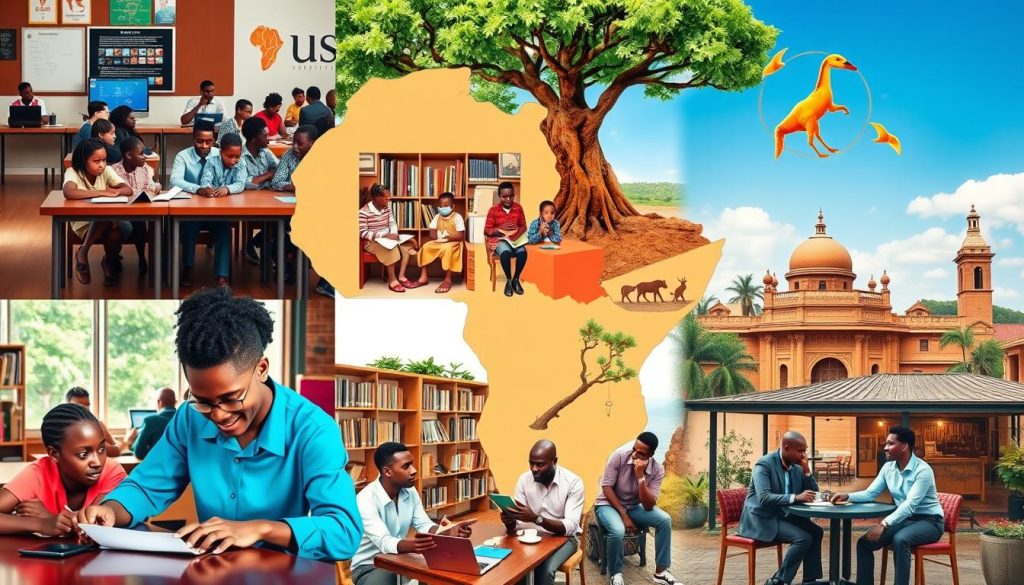Africa is seeing a big change in its education scene, opening up many business chances for entrepreneurs. The number of young people in Africa is growing fast. This means there’s a huge need for good education.
This need creates a big market for education, attracting investors from all over. The economy in Africa is getting stronger, and governments are supporting education more. This makes it a great time for those wanting to start an educational business in Africa.
Introduction to Africa’s Educational Landscape
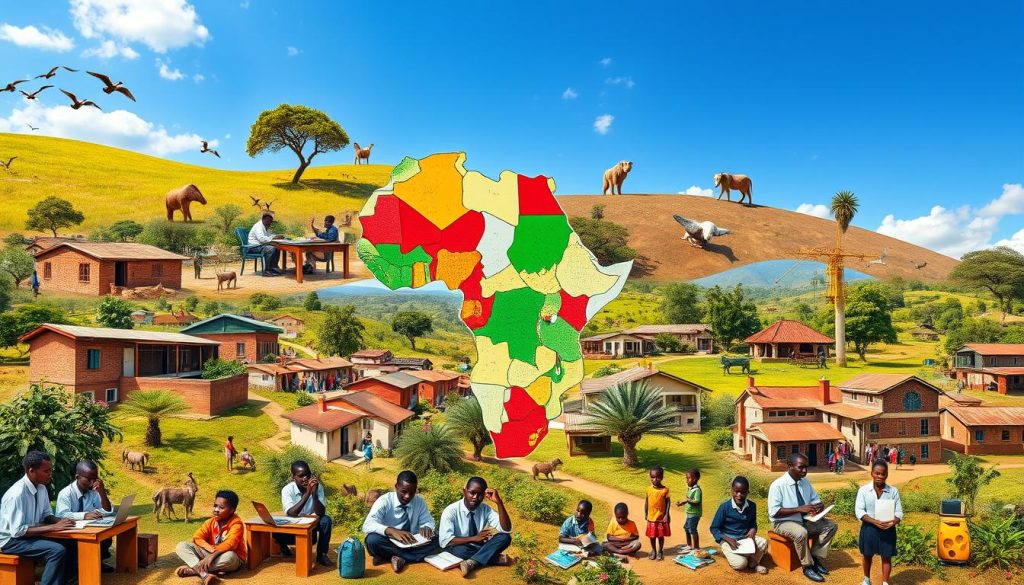
Africa’s education scene is complex and varied. It shows a mix of challenges and chances. The education systems differ a lot between countries and even within regions.
Historical factors, like colonial pasts and economic conditions, shape education today. These factors have a big impact on how education is delivered.
Getting an education is a big issue. Millions of kids, especially in rural areas, don’t have schools. Girls and kids from poorer backgrounds often can’t go to school as much as others.
This shows we need to act fast to improve education. We must make sure more kids can get a good education.
Urban areas usually have better schools and resources. But, rural areas struggle with poor buildings and a lack of teachers. We must work to make education fair for everyone in Africa.
Current Trends in Education Across Africa
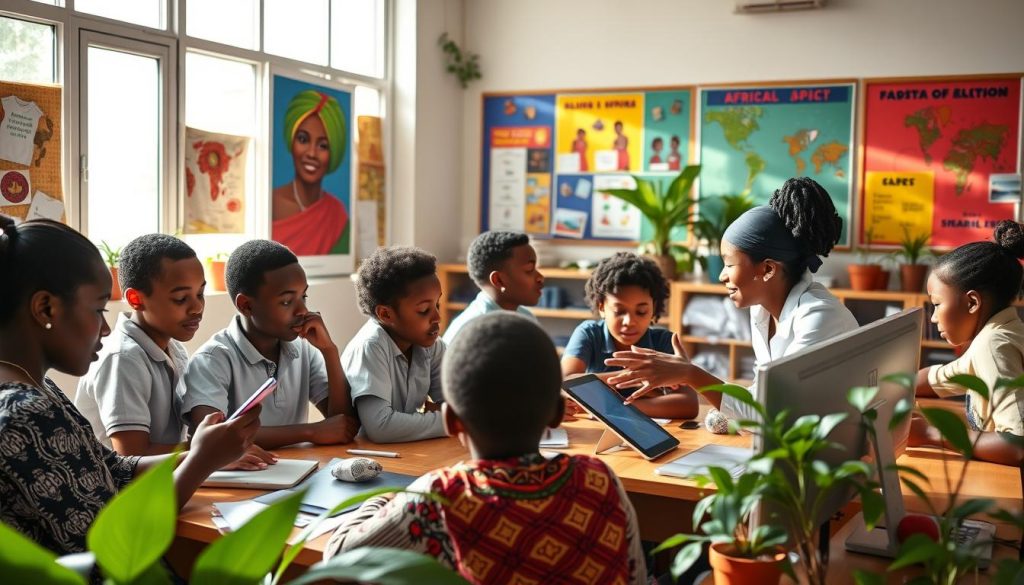
The education scene in Africa is changing fast. New methods and changes in society are leading the way. Learner-centric approaches are becoming popular, focusing on what students need and want. This makes learning more engaging and meaningful for everyone.
Technology is playing a big part in education today. Schools are using digital tools to improve teaching and prepare students for the future. Online learning has also made education more accessible, helping those in remote areas and offering flexible options for all.
Vocational training is getting more attention. It helps students learn skills that employers want. As cities grow and people move, schools are updating their programs to meet new job market needs.
Educational Business Opportunities in Africa
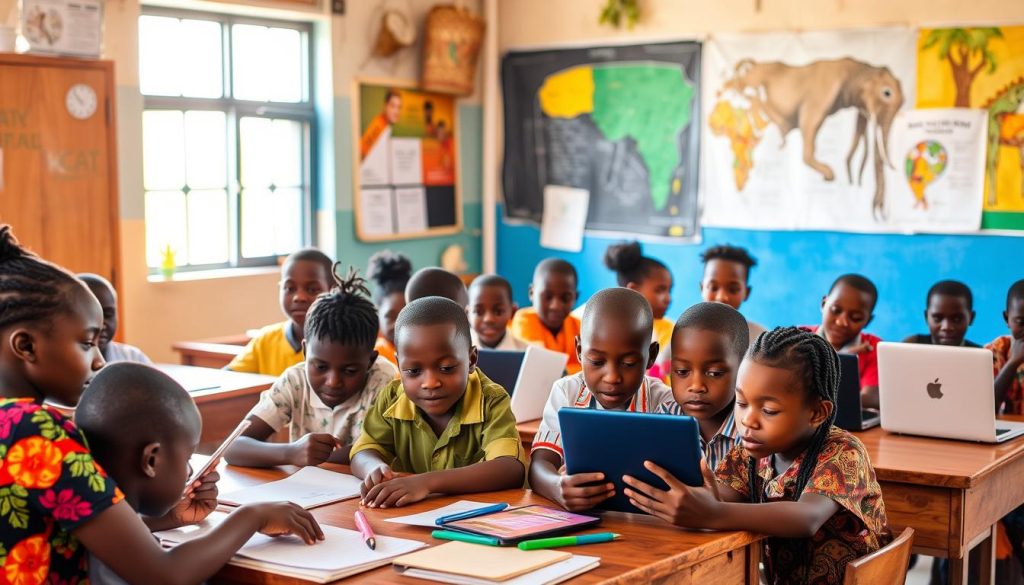
Africa is a vibrant place for educational business chances, especially in areas with high demand. The population is growing, and education is becoming more important. This means there are many opportunities for entrepreneurs to make a difference.
Key Areas with High Demand
Important areas like early childhood education, vocational training, and adult education are in high demand. Parents now understand how crucial early education is, creating chances for businesses. Vocational training is also key, as jobs need skilled workers. Adult education is growing, helping people keep learning and improving their skills.
- Early childhood education
- Vocational training
- Adult education
- Online learning platforms
Government Initiatives Supporting Education
Government support is vital for educational initiatives. Many national policies aim to improve education quality and access. These efforts often involve partnerships with the private sector, leading to better education reform. Governments see the value in working together to meet educational needs, benefiting society and the economy.
The Rise of EdTech in African Markets
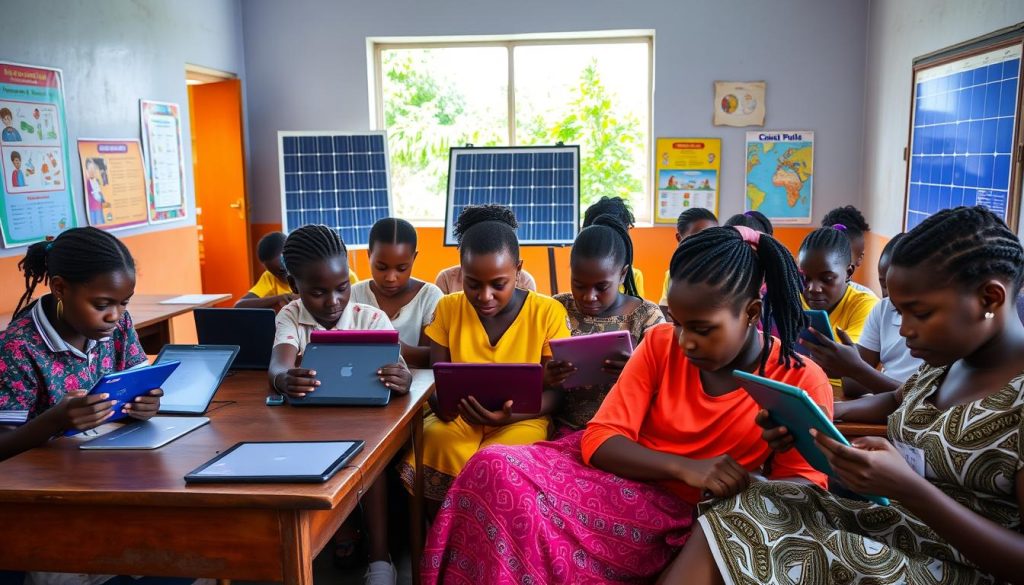
Education in Africa is changing fast, thanks to EdTech. This new way of learning uses advanced technology. It makes education more available and interesting for people all over the continent.
Innovative Technologies Changing Education Delivery
New technologies are changing education in Africa. Online learning sites, mobile apps, and virtual classrooms are changing how we learn. These tools make learning better and more flexible for students.
Some key technologies include:
- Mobile learning apps that let you learn anytime, anywhere.
- Interactive platforms that help students and teachers work together.
- AI tools that make learning personal, letting students learn at their own speed.
Investment Potential and Growth Projections
EdTech in Africa is a big opportunity for investors. With more people wanting education, EdTech startups are expected to grow a lot. Investors see the chance to make money because of:
- A young population wanting new learning tools.
- Government plans to improve schools.
- More internet and mobile phones being used.
Partnerships with Local Institutions

Working with local institutions is key for businesses wanting to improve education in Africa. By teaming up with local groups, companies can create solutions that really help the community. This way, they can earn trust and share resources for better results.
Benefits of Collaboration
Collaboration brings many advantages for educational projects:
- It helps understand local needs better.
- It boosts credibility by linking with known institutions.
- It gives access to shared resources like facilities and knowledge.
- It leads to better education by using local insights.
Case Studies of Successful Partnerships
Many partnerships have shown the power of working together for education. For example, a global tech firm and a local university teamed up. They created special e-learning platforms for African students.
This partnership made quality education more accessible. It also gave local teachers new tools to teach with.
These examples show the great results of businesses and local groups working together. They highlight how this teamwork can change education in many African countries.
Skills Development and Vocational Training Opportunities

Africa has a big skills gap. This makes skills development and vocational training very important. Training needs to match what employers want. This way, graduates can easily find jobs.
Government policies now focus more on technical and vocational education. They work with local industries to offer practical training. This hands-on experience is key for learning specific skills.
Looking at global trends, African countries can learn a lot. Successful models include apprenticeships, mentoring, and curricula that meet job needs. By adopting these, African education can improve a lot.
Investing in skills development brings many benefits. It helps people in their careers and boosts the economy. So, it’s crucial for governments, businesses, and schools to work together. They should make vocational training a key part of Africa’s growth.
Challenges Facing Educational Entrepreneurs in Africa
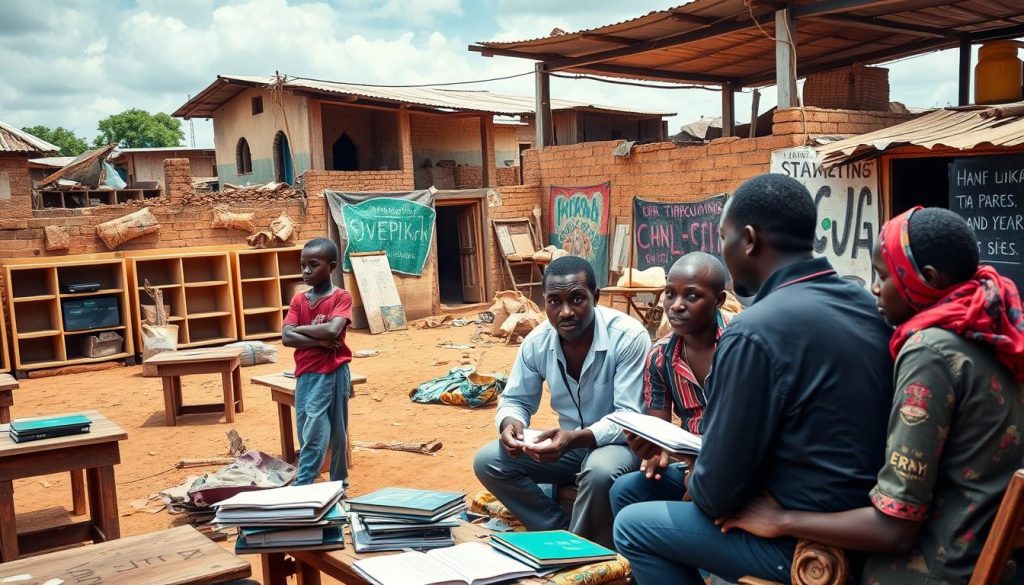
Educational entrepreneurs in Africa face many challenges. One big one is not having enough infrastructure. This means they often lack basic things like electricity and internet.
These issues make it hard for them to offer good learning solutions. They struggle to reach more people because of these barriers.
Another big challenge is dealing with complex rules and laws. It’s tough to start and run a business because of all the regulations. Entrepreneurs spend a lot of time and money just to follow the rules.
This takes away from their main goal of improving education. It’s a big problem for them.
Finding money to start and grow a business is also hard. Investors are often unsure if they will make money. Without enough money, entrepreneurs can’t do what they need to do.
This shows the need for new ways to fund education in Africa. It’s a big problem that needs solving.
Income levels also play a big role. Not everyone can afford education. Entrepreneurs need to find ways to make education affordable for all.
To overcome these challenges, entrepreneurs need to understand the local education scene well. By knowing the specific problems, they can come up with better solutions. Success depends on being able to adapt and innovate in this complex environment.
Funding Sources for Educational Initiatives
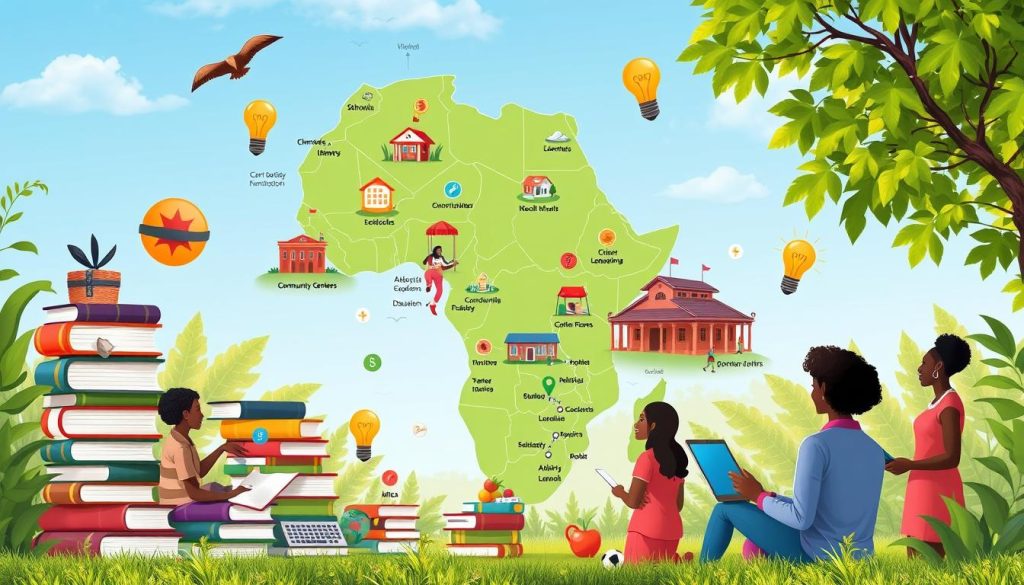
Getting enough money is key for educational projects in Africa to succeed. There are many funding sources, each with its own benefits and challenges. Knowing how public and private funding works can help find the right financial support.
Public vs. Private Sector Funding
Public money is a big help for educational projects in Africa. Governments set aside funds for these projects to boost literacy and education quality. This money is steady, but it can be limited by slow processes and other national needs.
The private sector is also playing a bigger part in funding education. Companies and charities see the value in investing in education for a better future. Private money can be more flexible, allowing for creative solutions that public funds can’t always provide. Working together, public and private sectors can make education projects more effective.
International Grants and Support
International grants are another important source of funding. Many groups give money to help improve education in developing areas. These grants usually have specific goals, matching global educational aims.
Charities, foundations, and foreign governments also offer financial help. To get this money, educational projects need to meet certain criteria. It’s important for entrepreneurs to look for and apply for these grants carefully.
The Role of Non-Governmental Organisations in Education
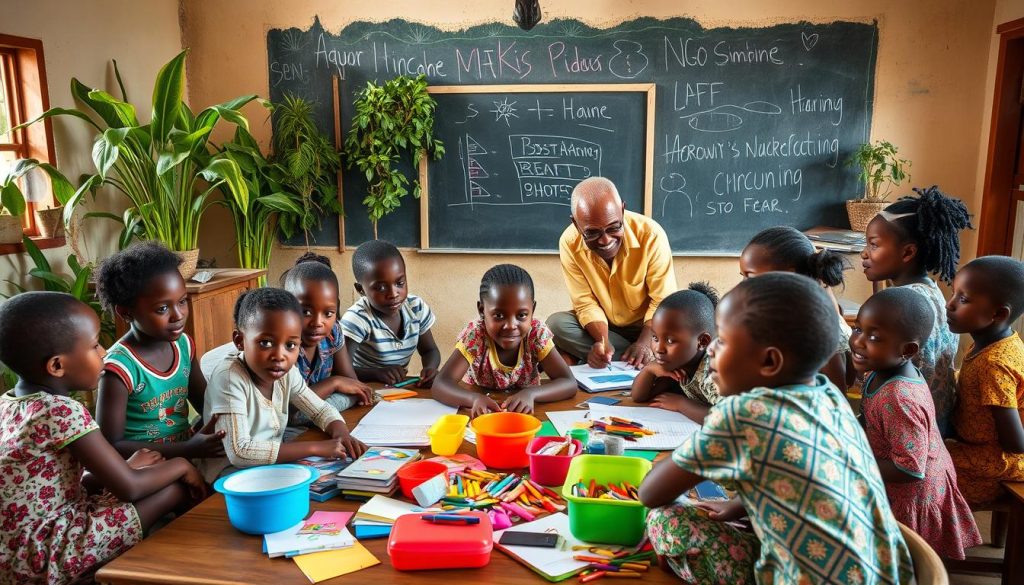
Non-governmental organisations (NGOs) play a key role in Africa’s education sector. They do more than just provide services. They also advocate, shape policies, and introduce new educational programs. Their work tackles big issues like making education accessible, improving quality, and making it relevant.
NGOs work together with governments and local groups on projects. They focus on helping those who are often left behind. For example, they train teachers, create learning materials, and bring technology to rural areas. These efforts improve learning outcomes and build a sense of teamwork in education.
There are many examples of successful partnerships between NGOs and schools. By sharing resources and knowledge, these collaborations lead to lasting improvements in education. For example, combining local wisdom with global best practices has led to significant educational changes that help many students.
In short, NGOs are vital in making education better in Africa. They help bring about big changes, aiming for education that is fair and of high quality for everyone.
Market Research and Feasibility Studies

Market research and feasibility studies are key to starting successful educational businesses in Africa. They give insights into the market, who to target, and who the competitors are. This helps entrepreneurs make smart choices that make their business strong.
For educational businesses, you need to do both qualitative and quantitative research. Qualitative studies look at what people want and need. Quantitative studies measure how big the market is and who’s in it. You can use surveys, interviews, and focus groups to get a full picture.
- Understanding local educational standards and expectations
- Identifying potential partnerships with local institutions
- Assessing technological infrastructure needed for EdTech solutions
Feasibility studies use analysis to look at money, plans, and possible problems. This careful approach makes investors trust the business. It also helps the business stay ahead in a competitive market.
Marketing Strategies for Educational Businesses
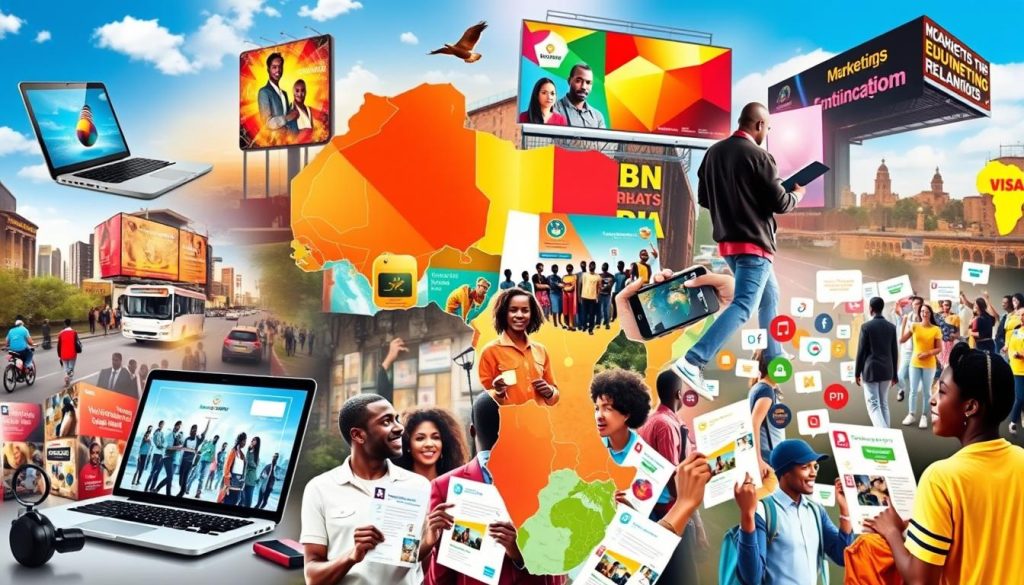
Effective marketing is key for educational businesses in Africa’s fast-changing education scene. Knowing your audience is vital. It helps shape your marketing plans. By understanding who you’re talking to, you can make your messages hit home.
Target Audience Identification
Finding the right audience is crucial for success. You should focus on:
- Parents looking for top-notch schools for their kids.
- Students searching for the right learning spots.
- Corporate partners wanting to sponsor or partner.
Knowing what these groups want helps you craft messages that really speak to them.
Utilising Social Media for Engagement
Social media is a great way for educational businesses to reach out. Sites like Facebook, Instagram, and Twitter are perfect for sharing news, promotions, and chatting with people. Good campaigns include:
- Creating content that highlights what you offer.
- Using ads to target specific groups.
- Sharing stories and feedback from happy customers.
By using social media wisely, you can build a strong online image. This boosts your brand and keeps customers coming back.
Case Studies of Successful Educational Businesses in Africa
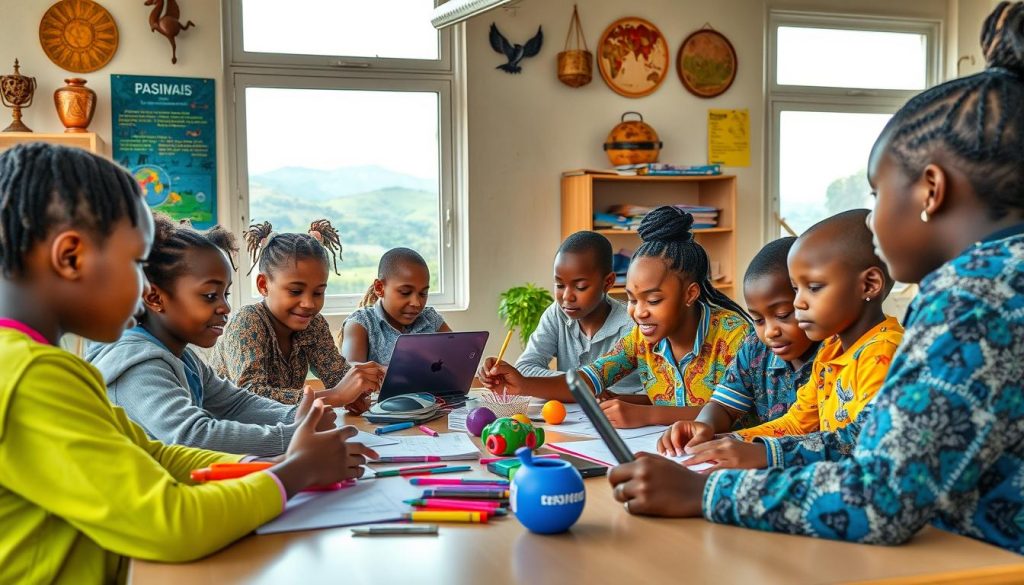
In Africa, many educational businesses have popped up. They show new ways to tackle local problems. These stories are full of success, giving us great ideas for making education better and more accessible.
Some examples stand out:
- Kwame Nkrumah University of Science and Technology (Ghana) – This school has made learning fun with technology. It uses online platforms to boost student interest and grades.
- Andela – This company trains software developers. It has changed many young Africans’ lives by teaching them valuable skills and linking them to big companies.
- M-Shule – This mobile app sends educational texts to students in Kenya. It helps kids in far-off places get the education they need.
These businesses show how smart plans can make a big difference in education. By studying their methods, others can learn how to tackle challenges and create lasting change in Africa’s schools.
Future Prospects for Educational Business Growth
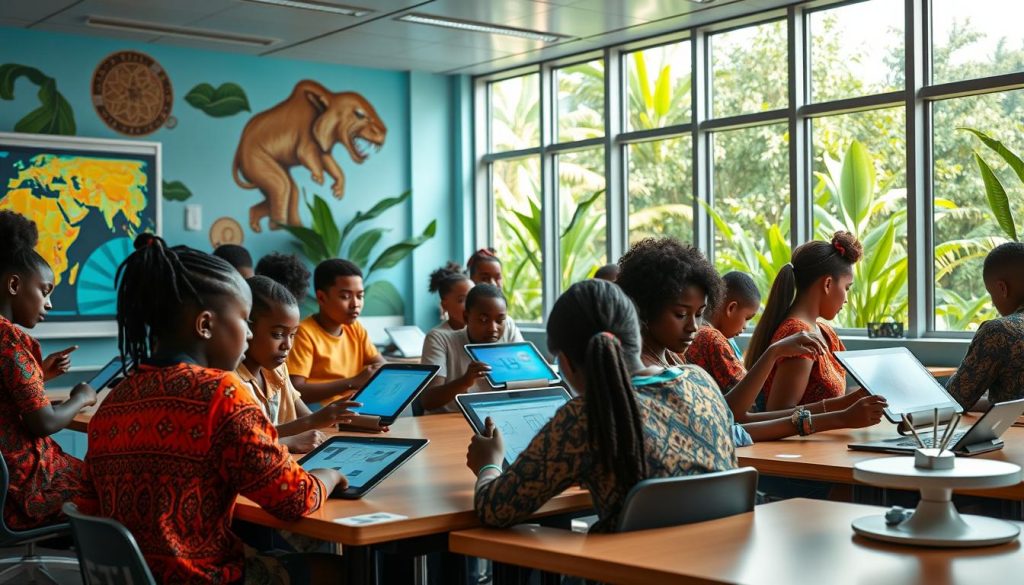
The educational scene in Africa is about to change a lot. New markets are opening up for educational businesses. With technology growing fast and more money going into education, it’s a great time for new ideas.
Knowing these trends helps businesses stay ahead in a tough market.
Emerging Markets and New Developments
As Africa’s economies grow, some markets are looking very promising for education. These areas have special features:
- More people have access to technology and the internet.
- Young people are looking for education more than ever.
- More government efforts to improve schools.
Getting involved in these markets can lead to good partnerships. It can help educational businesses grow in many areas, from schools to online learning.
Long-term Sustainability Considerations
It’s key to think about sustainability in education for long-term success. Businesses need to:
- Make eco-friendly materials and processes.
- Use practices that help the community and use local resources.
- Keep education relevant as technology changes fast.
By focusing on sustainability, educational businesses can ensure a bright future. They can also help improve education in Africa.
Conclusion and Final Thoughts on Opportunities in Education
The article has shown the huge educational chances in Africa’s education sector. This area is changing fast, thanks to new tech and a need for better education. It’s a great place for investors and entrepreneurs to look into.
But, there are big challenges like not enough money and old buildings. These problems also show ways to get involved and make a difference.
The outlook for education in Africa is bright. Governments, NGOs, and businesses are working together. They aim to improve skills and make education more accessible for everyone.
Investors can really help change things for the better. They can make a big impact and achieve lasting success.
To wrap up, Africa’s education sector is full of chances for growth. By tackling challenges and listening to what people want, we can help shape the future of education here.

